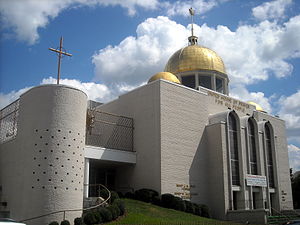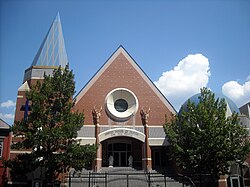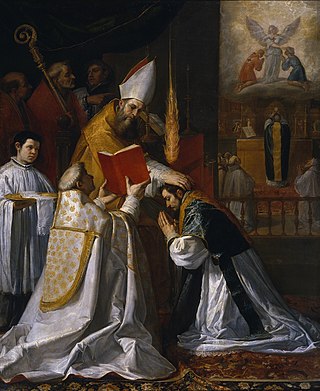
In certain Christian denominations, holy orders are the ordained ministries of bishop, priest (presbyter), and deacon, and the sacrament or rite by which candidates are ordained to those orders. Churches recognizing these orders include the Catholic Church, the Eastern Orthodox, Oriental Orthodox, Anglican, Assyrian, Old Catholic, Independent Catholic and some Lutheran churches. Except for Lutherans and some Anglicans, these churches regard ordination as a sacrament.
Methodism, also called the Methodist movement, is a Protestant Christian tradition whose origins, doctrine and practice derive from the life and teachings of John Wesley. George Whitefield and John's brother Charles Wesley were also significant early leaders in the movement. They were named Methodists for "the methodical way in which they carried out their Christian faith". Methodism originated as a revival movement within Anglicanism with roots in the Church of England in the 18th century and became a separate denomination after Wesley's death. The movement spread throughout the British Empire, the United States and beyond because of vigorous missionary work, and today has about 80 million adherents worldwide.
Pentecostalism or classical Pentecostalism is a Protestant Charismatic Christian movement that emphasizes direct personal experience of God through baptism with the Holy Spirit. The term Pentecostal is derived from Pentecost, an event that commemorates the descent of the Holy Spirit upon the Apostles and other followers of Jesus Christ while they were in Jerusalem celebrating the Feast of Weeks, as described in the Acts of the Apostles.
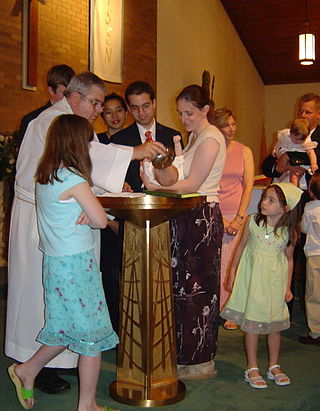
Infant baptism is the practice of baptizing infants or young children. Infant baptism is also called christening by some faith traditions.
The United Methodist Church (UMC) is a worldwide mainline Protestant denomination based in the United States, and a major part of Methodism. In the 19th century, its main predecessor, the Methodist Episcopal Church, was a leader in evangelicalism. The present denomination was founded in 1968 in Dallas, Texas, by union of the Methodist Church and the Evangelical United Brethren Church. The UMC traces its roots back to the revival movement of John and Charles Wesley in England, as well as the Great Awakening in the United States. As such, the church's theological orientation is decidedly Wesleyan. It embraces liturgical worship, holiness, and evangelical elements.

The Apostolic Faith Church of Portland, Oregon, also known as the Apostolic Faith Mission of Portland, Oregon, is an international Holiness Pentecostal denomination of Christianity, with nationwide reach and headquartered in Portland, Oregon, United States. It was founded in 1907 by Florence L. Crawford, who was affiliated with William J. Seymour and the Azusa Street Revival of Los Angeles, California. By 1908 Crawford had independently founded what would become the Apostolic Faith Church. The Superintendent General of the Apostolic Faith Church is Olusola Adesope.
Church of God is a name used by numerous denominational bodies. The largest denomination with this name is the Church of God.
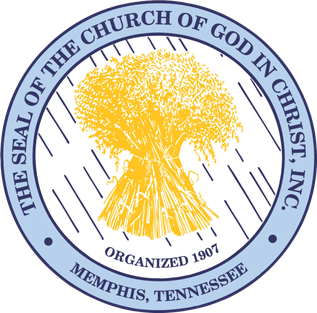
The Church of God in Christ (COGIC) is an international Holiness–Pentecostal Christian denomination, and a large Pentecostal denomination in the United States. Although an international and multi-ethnic religious organization, it has a predominantly African-American membership based within the United States. The international headquarters is in Memphis, Tennessee. The current Presiding Bishop is Bishop John Drew Sheard Sr., who is the Senior Pastor of the Greater Emmanuel Institutional Church of God in Christ of Detroit, Michigan. He was elected as the denomination's leader on March 27, 2021. On November 12, 2024, Bishop Sheard was re-elected by acclamation to serve another four-year term as the presiding bishop and chief apostle of the denomination.
The Azusa Street Revival was a historic series of revival meetings that took place in Los Angeles, California. It was led by William J. Seymour, an African-American preacher. The revival began on April 9, 1906, and continued until roughly 1915.

The Church of Our Lord Jesus Christ of the Apostolic Faith (COOLJC)is a Oneness Pentecostal denomination with headquarters in Manhattan. It was founded in 1919 by Robert C. Lawson. According to the Association of Religion Data Archives in 2020, the denomination had 85,938 members in 527 churches.

In Christianity, a minister is a person authorised by a church or other religious organization to perform functions such as teaching of beliefs; leading services such as weddings, baptisms or funerals; or otherwise providing spiritual guidance to the community. The term is taken from Latin minister. In some church traditions the term is usually used for people who have been ordained, but in other traditions it can also be used for non-ordained.
Pilgrim Holiness Church (PHC) or International Apostolic Holiness Church (IAHC) is a Christian denomination associated with the holiness movement that split from the Methodist Episcopal Church through the efforts of Martin Wells Knapp in 1897. It was first organized in Cincinnati, Ohio, as the International Holiness Union and Prayer League (IHU/IAHC). Knapp, founder of the IAHC, ordained and his Worldwide Missions Board sent Charles and Lettie Cowman who had attended God's Bible School to Japan in December 1900. By the International Apostolic Holiness Churches Foreign Missionary Board and the co-board of the Revivalist the Cowmans had been appointed the General Superintendents and the Kilbournes the vice-General Superintendent for Korea, Japan and China December 29, 1905. The organization later became the Pilgrim Holiness Church in 1922, the majority of which merged with the Wesleyan Methodists in 1968 to form the Wesleyan Church.
Catholicity is a concept pertaining to beliefs and practices that are widely accepted by numerous Christian denominations, most notably by those Christian denominations that describe themselves as catholic in accordance with the Four Marks of the Church, as expressed in the Nicene Creed formulated at the First Council of Constantinople in 381: "[I believe] in one, holy, catholic, and apostolic Church." The English adjective catholic is derived from the Ancient Greek adjective καθολικός, meaning "general", "universal". Thus, "catholic" means that in the Church the wholeness of the Christian faith, full and complete, all-embracing, and with nothing lacking, is proclaimed to all people without excluding any part of the faith or any class or group of people. An early definition for what is "catholic" was summarized in what is known as the Vincentian Canon in the 5th century Commonitory: "what has been believed everywhere, always, and by all."

The Assemblies of God USA (AG), officially The General Council of the Assemblies of God, is a Pentecostal Christian denomination in the United States and the U.S. branch of the World Assemblies of God Fellowship, the world's largest Pentecostal body. The AG reported 2.9 million adherents in 2022. In 2011, it was the ninth largest Christian denomination and the second largest Pentecostal denomination in the United States. The Assemblies of God is a Finished Work denomination, and it holds to a conservative, evangelical and classical Arminian theology as expressed in the Statement of Fundamental Truths and position papers, which emphasize such core Pentecostal doctrines as the baptism in the Holy Spirit, speaking in tongues, divine healing and the Second Coming of Jesus Christ.
The Four Marks of the Church, also known as the Attributes of the Church, describes four distinctive adjectives of traditional Christian ecclesiology as expressed in the Nicene Creed completed at the First Council of Constantinople in AD 381: "[We believe] in one, holy, catholic, and apostolic Church."

Wesleyan theology, otherwise known as Wesleyan–Arminian theology, or Methodist theology, is a theological tradition in Protestant Christianity based upon the ministry of the 18th-century evangelical reformer brothers John Wesley and Charles Wesley. More broadly it refers to the theological system inferred from the various sermons, theological treatises, letters, journals, diaries, hymns, and other spiritual writings of the Wesleys and their contemporary coadjutors such as John William Fletcher, Methodism's systematic theologian.

Marcelino Manuel da Graça, better known as Charles Manuel "Sweet Daddy" Grace, or Daddy Grace, was the founder and first bishop of the predominantly African-American denomination, the United House of Prayer For All People. He was a contemporary of other religious leaders such as Father Divine, Noble Drew Ali, and Ernest Holmes. Many of his followers claimed miraculous acts of faith healing while attending services and others saw his ministry as a sign from God of the imminent return of Jesus Christ.
Lutheranism is a major branch of Protestantism that identifies primarily with the theology of Martin Luther, the 16th-century German friar and reformer whose efforts to reform the theology and practices of the Catholic Church launched the Reformation in 1517. Lutheranism subsequently became the state religion of many parts of Northern Europe, starting with Prussia in 1525.

The Apostolic Church of Pentecost (ACOP) is a Finished Work Pentecostalism Christian denomination with origins in the Pentecostal revival of the early 20th century. Although multi-national, ACOP has its strongest membership in Canada. In 2002 ACOP reported "approximately 24,000 members in Canada, with 450 ministers and 153 churches." There are ACOP churches in all the provinces of Canada. ACOP's headquarters is in Calgary, Alberta.

